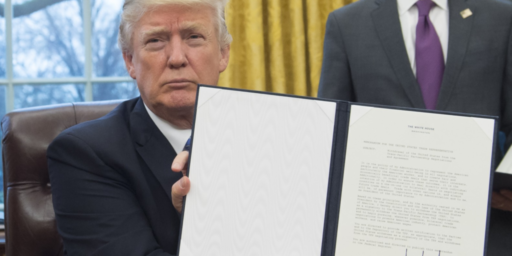GOP HYPOCRISY?
Brett Marston smells it in calls for Republicans to sue to end unconstitutional filibustering. His reasoning?
Republicans have gotten involved in the nominations fight with Democrats because of a professed belief that courts have been too powerful and activist in the first place. One should put this question to the Senate Republican caucus: Is the political question doctrine now itself a heritage of judicial activism (namely, activism with respect to powers of judicial self-limitation)? A lawsuit would show that the Republicans want to have their cake and eat it, too, by attacking judicial power when it suits them, but also calling upon that power when it suits them.
I agree that many Republicans–and Democrats–use the term “judicial activism” to mean “the Court ruled in a way I didn’t like.” Still, I don’t think this particular issue is a matter of hypocrisy.
Personally, I think Marbury v. Madison, the 1803 case in which the Court made up the power of judicial review, was wrongly decided. But the premise of that case was that Congress couldn’t by legislation change something in the Constitution. In that case, adding to the original jurisdiction of the Supreme Court. By that logic, the Republicans have a case here. The Constitution lists a very small number of things which require a super-majority vote in the Congress: off the top of my head, proposal of Constitutional amendments, Senate approval of treaties, and removal from office of impeached officials; there may be others. Confirmation of presidential appointees is not among them.
I would say that, if the Court were to rule the filibuster unconstitutional, it would have to do so across the board, not just with respect to confirmation of nominees.






Thanks for the comments, Jim!
Just because something is constitutionally required in some cases doesn’t mean it’s constitutionally prohibited in other cases. The constitution also gives the Senate the power to make its own rules (article I, Section 5: “Each House may determine the Rules of its Proceedings.”) To argue that supermajority requirements are NOT within the realm of “rules” is pretty fancy interpretive footwork.
But you’re also proving my broader point: there is a universe of indeterminate argument out there, about which reasonable people can disagree. Republicans have attempted to hijack the word “activism” in such a way as to make it mean “whatever doesn’t serve our interests or whatever our constituents don’t like.” That argument is more understandable as political rhetoric than as constitutional interpretation. So I’d still counsel people to take claims that courts are “activist” with a grain of salt.
No prob, Brett. I think there is such a thing as activism, and think it happens more often on the left than the right, but agree that it is sloppily used. I tend to think of it as the court overturning an act of a legislature through rather vague constitutional references.
I think Griswold v. CT and Roe v. Wade were both activist because their constitutional basis was rather flimsy. I think Brown v. BOE was activist, even though I agree with the result, because it relied on rather strained social science arguments about hurt feelings rather than on the much firmer basis of the 14th Amendment.
It strikes me that the filibuster is probably unconstitutional but, as I’ve noted before, also likely the type of “political question” that the courts stay out of. But, going back to Marbury, Article III gives Congress the power to set forth the rules and jurisdiction of the judicial branch. But Marbury says that doesn’t extend to adding original jurisdiction beyong those specified in the Constitution. I would think it’s a pretty reasonable argument to make that they therefore can’t add supermajority requirements.
Sure, Congress can set their own rules. But those rules can’t contravene the Constitution. If they decided that treaties could now by done by a simple majority, it would obviously be unconstitutional. Presumably, the enumeration of several instances of a supermajority (expulsion of members from office being one I forgot about) would rather clearly reflect the will of the Framers that those–and not other–actions required a supermajority.
—